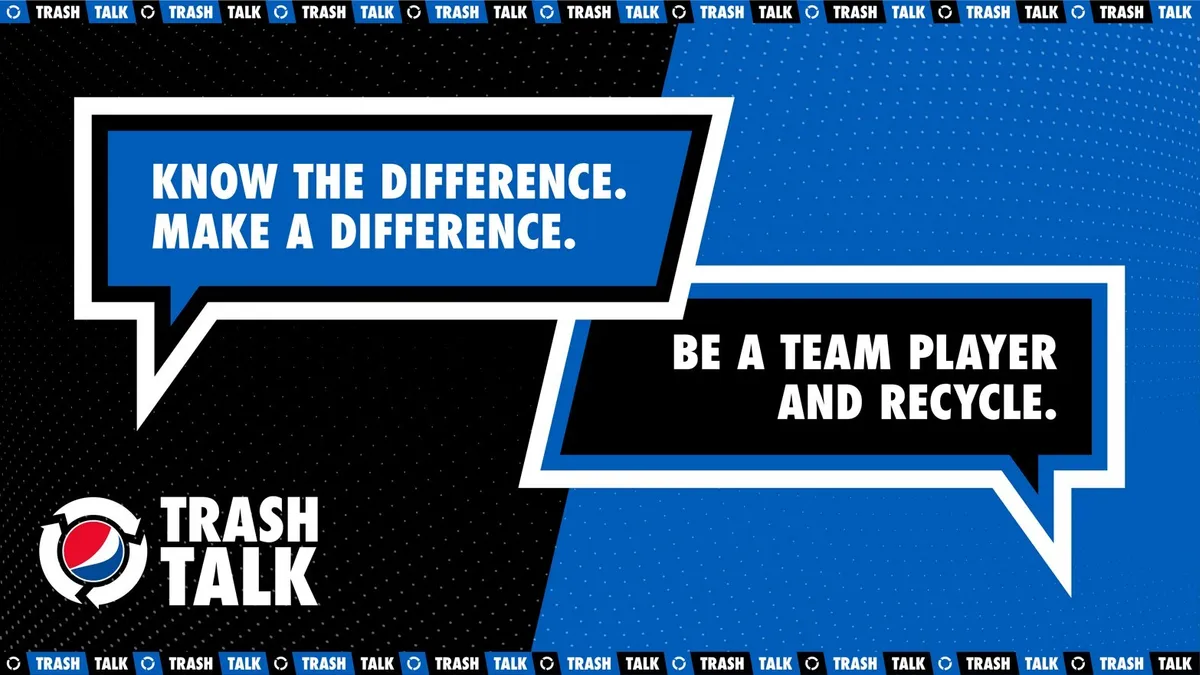Dive Brief:
- Pepsi is rolling out a "Pepsi Trash Talk" platform that enlists NFL stars to teach consumers the do's and don'ts of recycling, according to an announcement.
- A website hosts a series of PSAs where football players including Justin Herbert, Josh Allen and Chase Claypool share best practices for recycling, as well as videos breaking down which packaging materials can or can't be repurposed. The site also features an interactive game where players control a Pepsi-branded recycling bin that catches falling waste. When the bin moves under an object that can't be recycled, like an apple core or single-use plastic bag, the user gets a strike and explainer notification.
- The soft drink marketer said it would support the effort with a robust media plan, including a partnership with Deion Sanders where the so-called "king of trash talk" will plug the initiative on his Barstool Sports show "21st and Prime." The campaign is part of parent PepsiCo's new pep+ initiative that seeks to transform the company to be more environmentally friendly.
Dive Insight:
"Pepsi Trash Talk" is just one piece of the much larger pep+ transformation strategy unveiled today, but it serves as an early indicator of how one of the largest food and beverage marketers will use its media muscle and celebrity ambassadorships to educate consumers about sustainability. PepsiCo, which owns 23 billion-dollar brands, hopes that its approach will serve as a model for other companies as they ramp up efforts to combat the effects of climate change.
"Trash Talk" leverages a mix of PSA and gamification tactics to teach consumers about the importance of recycling and dispel common misconceptions about what materials are suited to be repurposed. It launches less than a week after NFL regular-season kickoff and as Pepsi, a longstanding league sponsor, ramps up its consumer-facing marketing around pro football through a "Made for Football Watching" platform.
Pep+ — pronounced "pep Positive" — touches across the entire PepsiCo portfolio and affects several areas of its operations, from agricultural practices down to packaging. On the latter front, Pepsi is aiming to produce all of its branded products in the U.S. in 100% recycled polyethylene terephthalate plastic (rPET) bottles by 2030. Pepsi Zero Sugar, a focus of the current NFL campaign with more than a dozen new ads, will start being sold in 100% rPET bottles next year as an early test. PepsiCo estimates the switch to rPET materials will lower greenhouse gas emissions by roughly 30% per bottle.
Other aspects of pep+ include pledges to reach net-zero emissions by 2040 and become net water positive by 2030. For its global food and beverage offerings, PepsiCo intends to cut its use of virgin plastic by 50% and use 50% recycled content in plastic packaging. The marketer will also dedicate more energy to scaling its SodaStream business that is centered on reusable sparkling water bottles.
"Pep+ is the future of our company — a fundamental transformation of what we do and how we do it to create growth and shared value with sustainability and human capital at the center," said Ramon Laguarta, PepsiCo's chairman and CEO, in a press statement. "It reflects a new business reality, where consumers are becoming more interested in the future of the planet and society."
More marketers are putting a spotlight on sustainability work as the impacts of climate change and excessive consumer waste grow more severe. Pepsi chief rival Coke earlier this summer partnered with mobility company Lime to encourage consumers to recycle its new Sip Sized bottles made from 100% rPET plastic — the brand's first new bottle size in a decade.















